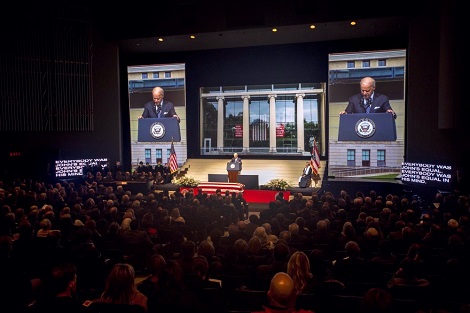[AUTHENTICITY CERTIFIED: Text version below transcribed directly from audio and edited for continuity.]
When John Glenn was 10 years old, his father, his hero, a veteran of World War I, taught him how to play "Taps" on the bugle. They'd play together on Memorial Day in New Concord [Ohio], small flags and flowers next to gravesites -- gravestones of the fallen. And John would recall that time and feeling when he said, where "Love of country was a given. Defense of its ideals was an obligation." And, "The opportunity to join in its [quests] and explorations was a challenge not only to fulfill a sacred duty but to join a joyous adventure.1
With John, all the years I knew him and worked with him was always a joyous adventure.
Annie, what a joyous adventure you and John had together, on display for your children and the whole world to see.
You all know it. You can tell when a couple really, genuinely loves and enjoys one another.
It was infectious.
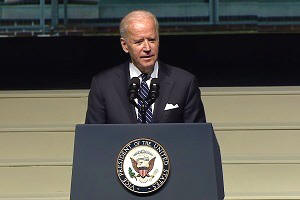 On behalf of President Obama and the First
Lady, on behalf of the American people, Jill and I are here because we
love you Annie, and we loved John. And together you taught us all how to love.
On behalf of President Obama and the First
Lady, on behalf of the American people, Jill and I are here because we
love you Annie, and we loved John. And together you taught us all how to love.
That's not something you usually talk about when you talk about heroes, especially heroes like John Glenn, who lived a life that was rigorous but tinged with just a little bit of magic.
Just a little bit of magic.
We talk about daring spirit, poise under pressure, mental and physical toughness, but for all his heroism that history will remember in war, in space, in public life, you felt something deeper with John.

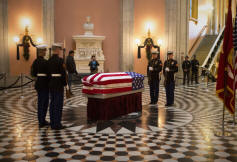
Annie, on the way to get to Air Force 2, I got a call from John Kerry, who's somewhere over the Atlantic on the way to another mission in the Middle East to try to deal with Yemen. And he told me about his time he got to spend with you a couple days ago, and the family. He pointed out, he said, "Joe, you know John's only the ninth person in history in the state of Ohio to ever lie in state. "Governor, I didn't know that."
Only the ninth in history.
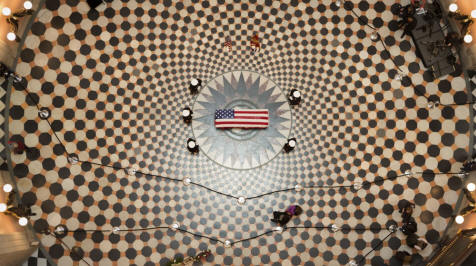
And he talked about how much it meant to him to be with you. And he gave, spontaneously, what I think is maybe the best description of John Glenn I've ever heard -- and I new John for 40 years. He said, "John came out of the heart of the country" -- like you kids do -- "and he stole America's heart." "Came out of the heart of the country and he stole America's heart."
And he did: He stole America's heart.
I remember as a kid, freshman in college, John's historic flight.
And Annie, you and John and Jill and I have been friends for 40 years. I know others have longer relationships but what a wonderful 40 years it has been.
We served in the Senate together side-by-side for 25 years, and we traveled around the world together. John was one of the happiest people I ever knew. Think about it -- one of the happiest people I ever knew. He had that infectious smile. Even when things looked like everything was crashing down, John would walk into my office or walk into a caucus with that big smile on his face and I wondered, "Where in the hell has he been?" "Did he not just hear what I just heard?" (You think I'm kidding. I'm not kidding.)
But the world knew, [revered], and respected John, from Columbus to Cambodia, from Washington to Beijing. He loved being a senator. He loved his constituents and his colleagues. He loved his staff, many of whom are here today. And, boy, did they love him back.
And you could feel his love for his country and for his state and for the Marine Corps. He was kind of partial to NASA.
But most especially you felt his love for you, Annie, and for Dave and Lyn, and his grandchildren. All you had to do, as I said, was see John and Annie just walk together, just the way they looked at each other, and you knew that's what it's supposed to be like.
I said that to Annie today before we came in and she said, "Well, that's like you and Jill." I said, "No it's different. Everybody knows I love Jill more than she loves me. I think you, [Annie], loved him just as much.
The last time we were together, when Jill and I had Annie and John over to the Vice President's residence -- I was looking at the picture this morning, Annie, of you guys walking down the steps, walking out to the gate, and Jill and I behind you. And the words of the poet Christopher Marlowe literally came to mind, and I had to rewrite this on the way to the plane. Christopher Marlowe said: "Come with me and be my love and all the pleasures we shall prove."2
Well, together, Annie, you and John proved all the pleasures. You not only had a magical love affair -- the other thing about you, you were partners. You were [unclear] partners. Together, you bore the way to fame and responsibility and with enormous humility, and a sense of duty that defined you as the greatest of America's greatest generation.
I think John defined what it meant to be America, what it meant to be an American, what we were about -- just by how he acted. Always about promise. We were a country of possibilities, opportunity. Always a belief in tomorrow.
Tomorrow.
When John was at the house a couple years ago it's all he kept talking about: "What are you going do now, Joe?" "What are we going to do tomorrow?" "We have all these opportunities."
Together, you and John taught us that a good life is built not on a single historic act -- or multiple acts -- of heroism, but a thousand little things; the thousand little things that build character, treating everyone with dignity and respect
John was one of the few of my colleagues who would be going to the restroom where there was a shoeshine guy. John would always pat him on the shoulder and give him a hug, understanding that despite fame and position everybody was John's equal.
Everybody was John's equal -- in his mind.
And it all comes down to being personal. The President always kids me, Annie, because I'm getting older, now. I could even try to improve on Tip O'Neill's admonition about "all politics is local." I don't think John agreed with that either. I think, and I think he thought, all politics is personal. It's all personal.
It all comes down to being personal -- to being there for family, and being there for friends, in good times and in bad times; like you and John were there for me and Jill when I was in the hospital. You were there for us when our son, Beau, was deployed and you were there when we buried him.
It's all about being personal.
Annie, you and John, as was mentioned earlier by the first speaker, were with Ethel [Kennedy]. I happened to be with Ethel Kennedy at an awards ceremony in New York, the little ripple of hope ceremony. And, ironically, a fellow who runs my office, who's a Ohio guy, said John "wasn't doing well." "You ought to call John." And I had a brief discussion with Ethyl as I sat with her. And the story is well known about him talking to the kids, being sent back to Hickory Hill. But what struck me was I was told that when you and John got to Hickory Hill, John walked into Senator [Robert] Kennedy's private study and saw that Robert Kennedy, who was the only political [uncertain] I ever had in my life, had out a book of Ralph Waldo Emerson's poetry. And it was opened up, and in a leaf of the book, there in the margins, were comments made by Robert Kennedy. And the passage that John, I'm told, remembered was where Emerson said, "This time, like all times, is a very good one, if we but know what to do with it."3
The thing that I liked most about John was he knew from his upbringing that ordinary Americans can do extraordinary things.
Ordinary Americans could do extraordinary things.
And he believed, I believe, he was confident that every successive generation would know what to do with it. And that's the charge I think John left us, Annie: to join our nation's conquests and our nation's explorations as a challenge, not only to fulfill a sacred duty, but to join in this joyous adventure.
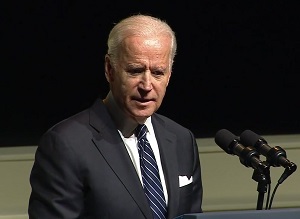 So when the Marine plays "Taps" on
the bugle at Arlington for our friend, we can look deep into the heavens
and know with certitude that John believed -- and was right -- that future generations of Americans
will also look deep within the heavens and understand how to explore, how
to serve, how to love; and will come to understand that if we're looking for
a message to send about our time here on earth, for what it means to be
an American: It's the life of John Glenn. And that is not hyperbole.
So when the Marine plays "Taps" on
the bugle at Arlington for our friend, we can look deep into the heavens
and know with certitude that John believed -- and was right -- that future generations of Americans
will also look deep within the heavens and understand how to explore, how
to serve, how to love; and will come to understand that if we're looking for
a message to send about our time here on earth, for what it means to be
an American: It's the life of John Glenn. And that is not hyperbole.
So, God bless you, John.
God bless you, Annie.
And may God protect our troops.
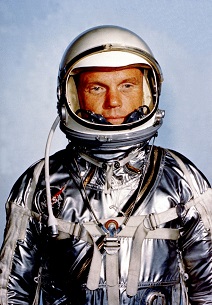
2 The Passionate Shepherd To His Love
3 Emerson, R.W. (1837). Oration Before the Phi Beta Kappa Society at Cambridge. The American Scholar.
Audio Source: C-SPAN.org
Images #1,#3,#4 Source: DVIDShub.net
Images #2, #6 (Biden): NASA TV/YouTube (Screenshots)
Image #7 (Glenn): https://commons.wikimedia.org
Page Updated: 3/5/24
U.S. Copyright Status: This text and audio = Property of AmericanRhetoric.com. Images #1,#3,#4 #5,#7 = Public domain. Images #2, #6 = Fair Use.

